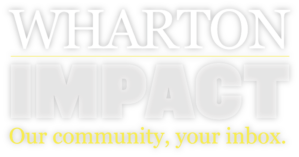October 2021 • Edition 2
In this edition, we are thanking our donors by celebrating the power of philanthropy at the University of Pennsylvania; highlighting how a leadership gift is supporting accountability and transparency in the media; and explaining how a new Asian alumni initiative is helping international students.
Celebrating the Power of Giving

During an event full of superlatives referencing the breadth and scope of the Power of Penn, the close of the University’s $5.4 billion fundraising campaign was celebrated at the Annenberg Center with a selection of speakers and videos that highlighted the world-changing power of giving.
Penn President Amy Gutmann hailed the Campaign as a relay race run by a team of champions who over distance, and with great endurance, laid new ground for University accomplishments that will generate impact well beyond the campus.
Power of Penn Campaign Chair Robert M. Levy, WG’74; Power of Penn Campaign Vice Chair and Vice Chair of the Board of Trustees Lee Spelman Doty, W’76; Chair of the Board of Trustees Scott Bok, C’81, W’81, L’84; and Former Chair of the Board of Trustees David L. Cohen, L’81, HON’21 spoke at the event. Levy — who announced the Campaign’s final $5.4 billion total — said, “Our original goal of $4.1 billion was a floor, not a ceiling. Thanks to the generosity of our donors, we have exceeded our goal.”
For the Wharton School, its More Than Ever campaign contributed $1.07 billion to the Power of Penn. The School’s new, state-of-the-art Academic Research Building was cited as a significant result of the overall Campaign. And the newly built Tangen Hall was acknowledged as a long-awaited interdisciplinary hub for student entrepreneurship and enterprise.
“Celebrating Wharton and Penn, and understanding the scope and magnitude of the generous philanthropy, stirred tremendous pride and highlighted the incredible trajectory and future vision of Penn,” said Dan Schwab, W’91, co-president of D&H Distributing and a member of the Wharton Undergraduate Executive Board. “Connecting with alumni friends always makes returning to Penn meaningful, and this powerful event showcased incredible new facilities and the breadth and impact of faculty leadership.”
Wharton Dean Erika James, who was featured among Penn deans and center leaders in a video of appreciation, said, “Thanks to the Power of Penn Campaign, the Wharton School has energized its capacity to incubate ideas, generate practical industry-specific knowledge, and educate world-changing leaders.”
President Gutmann closed the event by saying, “The single greatest honor in my life is leading this incredible University and partnering with all of you to change lives and make our world better. So thank you all. You are the power of Penn.”
Helping Advance Media Responsibility

Misinformation in the media is believed to have harmful effects on public opinion, political polarization, and, ultimately, democratic decision making. To address this problem, the Penn Media Accountability Project (PennMAP) is building technology to detect patterns of bias and misinformation in media from across the political spectrum, spanning television, radio, social media, and the broader web.
A new leadership gift from Richard Jay Mack, W’89, is helping enable this expansion for PennMAP, which is an interdisciplinary, nonpartisan research project dedicated to enhancing media transparency and accountability.
“This gift will further the incredible work at PennMAP and is testament to the shared belief of proud Wharton alumni, like Richard, in the critical nature of this timely, groundbreaking research and applied insight,” said Wharton Dean Erika James.
Led by Stevens University Professor Duncan Watts, PennMAP is a product of the University’s Computational Social Science Lab (CSSLab), a joint venture of the School of Engineering and Applied Science, the Annenberg School for Communication, and the Wharton School.
Creating Better Access to Education for
International Students

Intended to support international students, a new initiative spearheaded by Wharton alumni in Asia is helping to expand financial aid opportunities for Wharton’s undergraduates from that region. The initiative will also support Penn’s top priority of increasing affordability for international students.
“The Wharton Asia Alumni Scholarship Initiative (WAASI) is a great way for alums and friends of Wharton to have a direct impact,” said Kenny Lam, W’96, vice chair of the Wharton Executive Board for Asia and a volunteer leader for WAASI. “We can all do our small share in making our world more connected, and we can do that through creating better access to education.”
During a meeting of the Executive Board for Asia in May, Lam presented the idea of building a cohort of named scholarship donors based in Greater China. Momentum for WAASI, which translates to “wow” in Chinese, grew rapidly, with plans to extend the initiative’s reach to all of Asia.
The initial goal was to establish a cohort of 10 alumni who would endow new scholarships. Within four months of launching, WAASI has already created 14 endowed scholarships and is making plans to build its next cohort of alumni donors.
“Many talented and smart students around the world have humble family backgrounds, especially those from developing nations,” said Xing Liu, WG’04, who is also one of the initiative’s leaders. “We felt that working toward making admissions need-blind for international students would be something that our community in Asia could get behind.”




